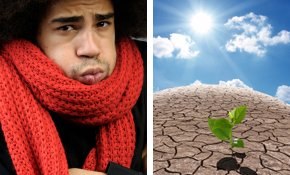Poll: 56% of Britons prefer very hot weather to very cold; Scots respondents more likely to say cold
When given the choice between the two extremes, over half of Britons say they would prefer extremely hot weather to extremely cold weather, our poll has shown – amid the highly unpredictable last few weeks of the Great British summer.
- 56% of Britons said they'd prefer extremely hot weather to extremely cold
- While 27% said the opposite
- 17% weren't sure
Scottish respondents: more likely to prefer cold
Significant regional differences emerged, with our respondents in Scotland more comfortable than the rest of the country with the idea of extremely cold weather, and less comfortable than everyone else with the idea of extremely hot weather.
- 37% of Scottish respondents to this poll said they would prefer extremely cold weather, compared to an average of 25% across the rest of the country
- While 61% of respondents in the North said they'd prefer extremely hot weather – a full 14% more than those in Scotland
Flood alert
As ever, this summer's weather has been nothing if not eventful, with reports that a 'south-lying' jet stream was behind weeks of rain from May onwards, causing an extremely sodden Diamond Jubilee weekend and almost 30 flood alerts nationwide by July.
Nerves surrounding the weather at this year's London Olympic Games proved mainly unfounded, however, as the sunshine – or at least, absence of rain – managed to hold out where necessary for all but a few events (including the Opening and Closing ceremonies).
Chance of thunderstorms?
However, the unpredictability of the climate has been in evidence more recently, with last Sunday's forecast 'scorcher' briefly scuppered by mutinous rainclouds and heavy rainfall, causing play at Lords cricket ground to stop, not to mention causing havoc for those with picnic plans.
The BBC, who faced criticism for allegedly misreporting the full day's forecast, apologised for the incorrect information, explaining that although the UK Met Office computers had suggested thunderstorms, evidence for the interruption had been so unpredictable that they had not considered it necessary to publish.
"Forecasters thought that [the thunderstorms prediction] wasn't supported by enough evidence and so we went for the dry, hot option," weatherman Philip Avery said of the error. "Having said that, apologies to anyone who had their next few hours ruined."
Those searching for extremes in temperature will have to look elsewhere, however, with the hottest reading on Earth taken in Libya, Africa in 1922, at 57.8 degrees Celsius. The coldest natural surface temperature reading, a bone-crushing −89.2 °C, was reportedly taken at the Soviet Vostok Station in Antarctica, in 1983.









